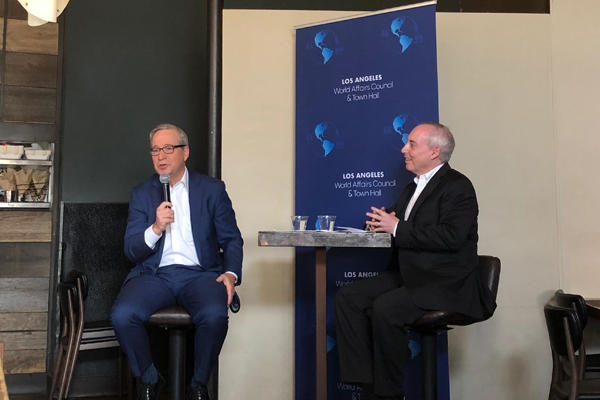
Atlantic Senior Editor Ron Brownstein with 2020 Election Series' host Dan Schnur
Amidst the high-intensity early state primary season, The Los World Affairs Council & Town Hall invited Senior Editor at the Atlantic, Ron Brownstein, to discuss key voter groups and demographics that will decide the 2020 primary and general election. This event on February 13th 2020, was the 5th Kal Eisenberg Breakfast: an ongoing series that tackles the most critical issues leading up to the 2020 election. The series is hosted by Dan Schnur, a dynamic politics professor and LAWACTH board member.
Brownstein is a two-time finalist for the Pulitzer Prize for his coverage of presidential campaigns. Just two days after the New Hampshire primary, Brownstein provided a critical perspective on the Democrats still running and connected this analysis to the question of key voter groups. While an extremely complex issue, his central message was concise:
“They’re all niche candidates.”
No candidate, thus far, has demonstrated an ability to unite a broad, majority coalition among the center-left political spectrum. While Sanders is now the front-runner post-Iowa and New Hampshire, Brownstein argued that his support faces a ceiling, at around 30% of Democrats. Other candidates who have been trailing Sanders— Buttigieg, Warren, and Biden—have major weakness as well. While they may resonate with some of the key groups Democrats need to win in 2020 – such as young voters, voters of color, or white college educated voters – no single candidate can appeal to a solid coalition among these groups.
It is extremely perplexing to political pundits why the race has not yet consolidated around two or three candidates. Some explain the crowded field stems from Democrat’s fear of a Trump re-election and obsession over electability. Others point to this year’s unique primary structure. Brownstein offers a different perspective, coming back to the idea of a field full of niche candidates. He argues:
“There’s a hole in this race the size of Kamala Harris’ campaign. She was the candidate best positioned between the center-left and far left in the party. She, or maybe Beto O’Rourke, could have energized a coalition between these two groups.”
While Sanders provides the clear, leftist and progressive candidate, and the moderate lane is flooded with alternative options, there is no candidate that can, at this moment, speak to such a coalition. From this, Brownstein wrote in his recent Atlantic piece:
“That could guarantee a lengthy war of attrition for the nomination—and possibly even a brokered convention—as the leading contenders divide the Democratic voter base along lines of race, class, generation, and ideology.”
With just two states down, only time will tell.
By Claire Krelitz
